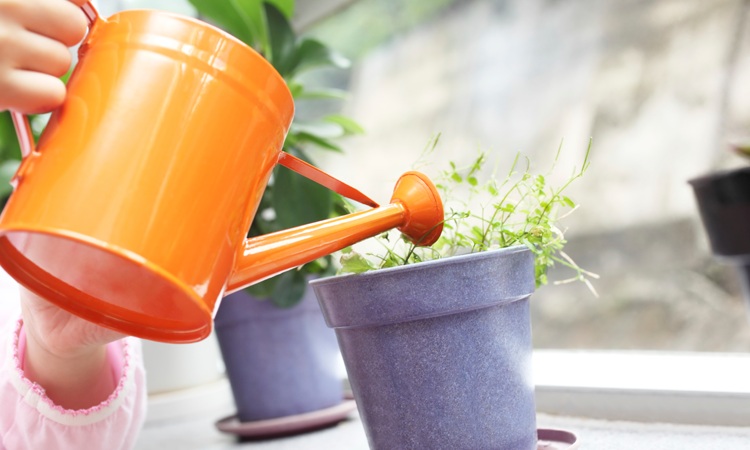
Each week when I water my houseplants, I am surprised by the subtle changes that have taken place in such a short time. Most of my plants started from seeds or cuttings and continue to grow, sometimes despite their environment and caretaker. Pruning and watering are my moving meditation, and I would like to share the life lessons they have taught me.
Be Adaptable
Many of the plants started out in another apartment with much different light and colder indoor winter temperatures. When I first moved into this Brooklyn apartment in the summertime, I had to monitor how they were responding to the available light. Some responded well and others dropped their leaves in protest. Eventually they adjusted in leaf size and color. For the ones that dropped leaves or browned, I trimmed them back and let them start over.
We, too, may move or end up outside of our comfort zone, whether by choice or involuntarily. In response, we may have to change, cut our losses, or grow where we are. A few plants grew back fuller once I trimmed them. Nature teaches us the wisdom in surrendering to adaptation, so we can figure out how best to derive what we need where we are. Admittedly, a plant does not have the option to change its environment, as we do. The wisdom, though, is recognizing when to use our abilities to change what we can or to grow within the spaces we cannot change.
Pay Attention to Your Body
A plant’s leaves reflect its health: Discoloration, spots, insects, and shape all indicate that something is missing for the proper nurturing of that plant. Likewise, the condition of our skin, hair, teeth, and eyes reveals key information about our physical health. Taking some time to assess these areas and making any necessary adjustments might not only change your current health, but prevent more serious illness in the future.
Letting Go
When a leaf dies, the plant releases it. The plant does not need to divert nutrients to something it no longer needs, so it lets it go. If there are objects, matters, relationships, habits, environments, or ideas that are not contributing to your livelihood, it may be time to release them, too.
Patience
Everything in nature has its small beginnings. My avocado plants started as pits—now they are almost 6 feet tall, and the process took some time. The beauty unfolded gently. If everything bloomed all at once in spring, the effect would not be as dramatic as the natural debut for each flower. Although we wouldn’t yell at a rosebud to bloom faster, we often get impatient with ourselves if we are not learning a life lesson or achieving a goal as quickly as we think we should. Nature’s wisdom in patience applies to us, too.
Expand
When plants outgrow their pots, they need a bigger space to grow. After the transplant, they experience a little shock as the roots adjust and grow beneath the soil. Once it becomes firmly rooted again, though, the plant can grow. Likewise, we may be in a challenging situation where we set a lofty goal or confront a fear. After some initial feelings of disorientation, we acclimate to our new selves and can grow beyond what we thought was possible.
We Can Always Start Over
On a few occasions I have had plants that I believed were dead, only to be surprised by their resurrection. I once planted a spider plant baby with some new dirt in a pot that had previously contained a flowering plant. A few months later, the former plant sprouted up alongside the spider plant. All is never lost! We can always start over, from the roots of our soul.
Spring reminds us of the cycles of life and spirit. With a little awareness, patience, and faith, we can thrive in just being ourselves.
To find out about Rose’s thoughts on how to live a happier life, click here



2 Comments
Vernesa
What a great story. Your article has been an inspiration to me, it has given me hope.
carol giovanelli
I have plants, I have started plants, I love to see them grow BUT you have just shown me another way to look at my plants. thank you so much!